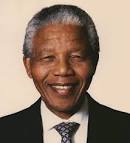L
LequteMan
Guest
President Jacob Zuma of South Africa has announced that the Late anti-apartheid hero, Dr Nelson Mandela, would be buried on Dec. 15 at his ancestral home in the Eastern Cape.
He said the country's first black president would be laid to rest in a family plot at his ancestral village of Qunu, 700 km (450 miles) south of Johannesburg where 3 of Mandela's children and other close family members had been buried.
Zuma had also announced that the former president would be honoured with a Dec. 10 memorial service at Johannesburg’s Soccer City Stadium, the site of the 2010 World Cup final.
South Africans united in mourning for Nelson Mandela on Friday. Some celebrated his remarkable life with dance and song.
Others fretted that the anti-apartheid hero's death would make the nation vulnerable again to racial and social tensions.
On Friday, the country's 52 million people absorbed the news that their most revered statesman, a global symbol of reconciliation and peaceful co-existence, had departed forever.
Flags flew at half mast across the country, and trade was halted for five minutes on the Johannesburg Stock Exchange.
But the mood was not all sombre. Hundreds filled the streets around Mandela's home in the up market Johannesburg suburb of Houghton, many singing songs of tribute and dancing.
Many attended church services, including another veteran anti-apartheid campaigner, former Anglican Archbishop of Cape Town, Desmond Tutu.
Mandela rose from rural obscurity to challenge the might of white minority rule, a struggle that gave the 20th century one of its most respected and loved figures.
He was among the first to advocate armed resistance to apartheid in 1960, but was quick to preach reconciliation and forgiveness when the white minority began easing its grip on power 30 years later.
He was elected president in landmark all-race elections in 1994 after helping to steer the racially divided country towards reconciliation and away from civil war.
Mandela was awarded the Nobel Peace Prize in 1993, an honour he shared with F.W. de Klerk, the white Afrikaner president who released him in 1990.
Reacting to his death, the Nobel Committee said Mandela would remain one of the greatest ever prize winners.
In 1999, Mandela handed over power to younger leaders better equipped to manage a modern economy, a rare voluntary departure from power cited as an example to African leaders.
This made him an exception on a continent with a bloody history of long-serving autocrats and violent coups.


He said the country's first black president would be laid to rest in a family plot at his ancestral village of Qunu, 700 km (450 miles) south of Johannesburg where 3 of Mandela's children and other close family members had been buried.
Zuma had also announced that the former president would be honoured with a Dec. 10 memorial service at Johannesburg’s Soccer City Stadium, the site of the 2010 World Cup final.
South Africans united in mourning for Nelson Mandela on Friday. Some celebrated his remarkable life with dance and song.
Others fretted that the anti-apartheid hero's death would make the nation vulnerable again to racial and social tensions.
On Friday, the country's 52 million people absorbed the news that their most revered statesman, a global symbol of reconciliation and peaceful co-existence, had departed forever.
Flags flew at half mast across the country, and trade was halted for five minutes on the Johannesburg Stock Exchange.
But the mood was not all sombre. Hundreds filled the streets around Mandela's home in the up market Johannesburg suburb of Houghton, many singing songs of tribute and dancing.
Many attended church services, including another veteran anti-apartheid campaigner, former Anglican Archbishop of Cape Town, Desmond Tutu.
Mandela rose from rural obscurity to challenge the might of white minority rule, a struggle that gave the 20th century one of its most respected and loved figures.
He was among the first to advocate armed resistance to apartheid in 1960, but was quick to preach reconciliation and forgiveness when the white minority began easing its grip on power 30 years later.
He was elected president in landmark all-race elections in 1994 after helping to steer the racially divided country towards reconciliation and away from civil war.
Mandela was awarded the Nobel Peace Prize in 1993, an honour he shared with F.W. de Klerk, the white Afrikaner president who released him in 1990.
Reacting to his death, the Nobel Committee said Mandela would remain one of the greatest ever prize winners.
In 1999, Mandela handed over power to younger leaders better equipped to manage a modern economy, a rare voluntary departure from power cited as an example to African leaders.
This made him an exception on a continent with a bloody history of long-serving autocrats and violent coups.



